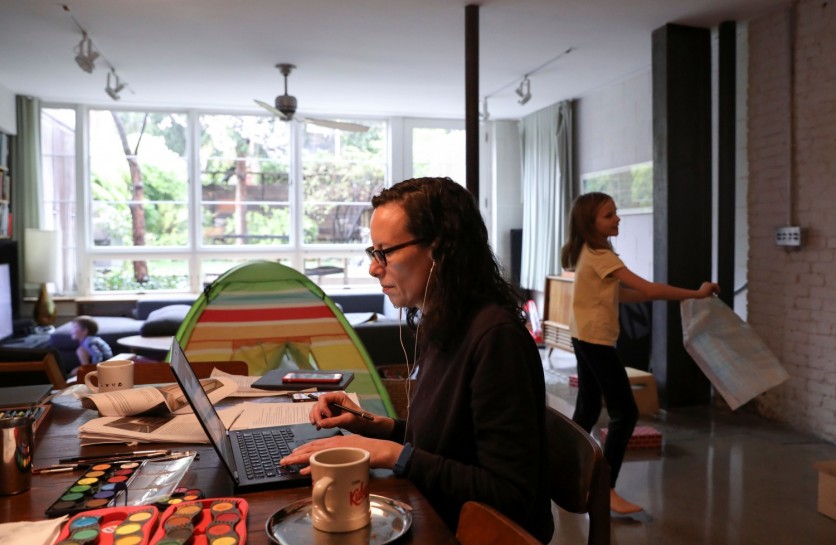The current coronavirus pandemic is forcing everyone into a moment of reckoning about how to balance work and family life in the country.

READ ALSO : [BREAKING] COVID- 19 Update: Virus Dies in 2 Minutes When Faced on Direct Sunlight, U.S. Official Says
In current days and for the foreseeable future, people are being asked to keep their full-time jobs while homeschooling kids, taking care of aged relatives and people with unique needs, and being concerned for the sick.
Even for the rather privileged people, this is lots to handle. For the less privileged, the pressure is compounded by pressing questions about how they'll feed, clothe, and keep their families home.
But the fundamental elements of this work-life crisis aren't new. For so long, Americans have pretended that private lives should be separate from work.
In 1990, sociologist Joan Acker noted that organizations "count on a disembodied and universal worker." The closest element to this ideal, she wrote, "is the male worker whose lifestyles focus on his full-time job, while his wife takes care of the personal needs and the kids."
This is attainable, maybe, while men are breadwinners and women are homemakers. But, during history, that story has hardly been the dominant one and has been continuously class-specific. And that isn't the current reality. Families with parents - in which one is hired, and one takes care of the home - are in the minority now.
Scrambling behind the scenes
While people may talk more about work-life balance and integration" these days, little has changed because Acker wrote that piece three decades ago. Many employees haven't had much choice but to approach work just like the metaphorical swimming duck, smooth and calm at the top while its toes pump furiously below.
People go about their jobs, at the back of the scenes, are scrambling on work-life balance. They make provisions for the sick kids who can't go to school and special-wishes member of the family who requires care.
CNET said 61% of the employees, including those from Google and Facebook, are putting in at least three extra hours each day to complete their work as a result.
"For people who have a family, you feel that you have to operate as if you don't," Carolina Milanesi, an analyst at Creative Strategies, told CNET.
She's faced many of those struggles firsthand, sharing online about navigating lifestyles in the tech world while homeschooling her daughter. Milanesi said coronavirus disaster would change how everyone would prioritize lifestyles and family, she said.
Milanesi expressed her optimism that the post-coronavirus crisis would help the employees be "more flexible" and "humanize workers more."
Flexibility
Some groups are already rethinking how they treat the employees with families. On April 16, Google prolonged a unique paid family leave plan amid the crisis. The compensation would be giving up to 14 weeks paid day off (or 28 weeks of half time off) to help its more than 103,000 employees take care of loved ones.
Facebook followed a similar version for its roughly 45,000 personnel, according to the Los Angeles Times. The social media platform said in March that it will allow up to four weeks paid leave even as schools are closed. It also endorsed managers to allow their personnel to have flexible working hours or even additional break day to manage family life amid the crisis.
Brynn Harrington, the company's vice president of people growth, told CNET, it's the first time Facebook made such move. She said the social network is acknowledging "you wanting to be in your life."
"It's no longer 'I want to get to my kid's school concert.' It's 'I need a four-hour block to take care of my kids," Harrington said.
Apple, meanwhile, said it had increased communications with managers and personnel since the outbreak began. Its 137,000 employees have been encouraging to ask for help or accommodation. However, managers were informed to assist their employees too proactively. That's meant presenting flexibility, whether it's for parents running decreased schedules, or caregivers who've to take a day-off to take care of family members.
Apple spokeswoman Kristin Huguet told CNET no deadline is "just too important." No precedence is more urgent than worrying about our loved ones, she added. She said Apple's goal is to be flexible, collaborative, and accommodating of each determine and caregiver on its teams.
Work-life balancing act
The situation isn't just a Silicon Valley problem, according to career experts. Most employers seem to understand that employees are "experiencing specific challenges to their situation," said Amelia Green-Vamos, career trends professional at agency evaluation site Glassdoor. Green-Vamos told CNET this evolving situation calls for more flexibility.
Still, 28% of US adults from various industries said their agency "has carried nothing in response to concerns of the COVID-19 coronavirus outbreak," according to a survey by The Harris Poll for Glassdoor. And only 16 percent of respondents said groups offered additional paid or unpaid sick leave.
While it's still too early to say what the long-term effect will be, Green-Vamos said this new way of working is an exciting test for Silicon Valley.
ⓒ 2026 TECHTIMES.com All rights reserved. Do not reproduce without permission.




